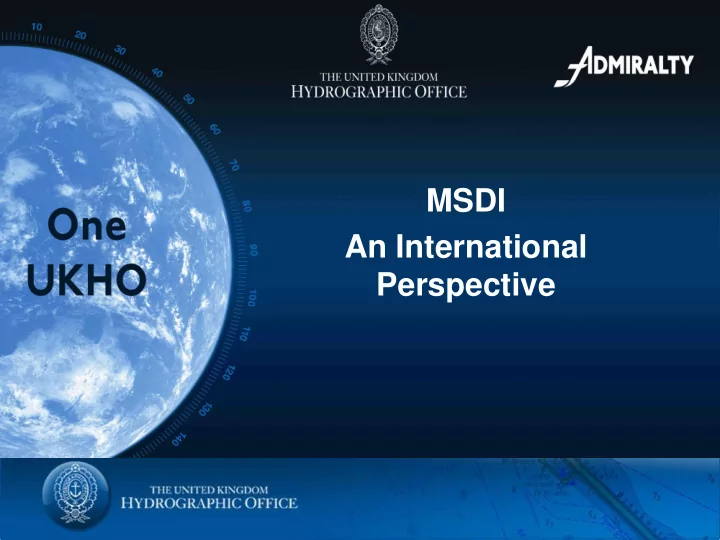

MSDI An International Perspective
Purpose of Hydrography • International Hydrographic Organisation (IHO) definition of hydrography: • • “the measurement and description of the physical features of oceans, seas, coastal areas, lakes and rivers, …. …. for the primary purpose of safety of navigation and all other marine purposes and activities, including economic development, security and defence, scientific research, and environmental protection”
Six Degrees of Separation - Hydrography
What is MSDI "Spatial Data Infrastructure" (SDI) often used to denote; "the relevant base collection of technologies, policies and institutional arrangements that facilitate the availability of and access to spatial data. " SDI provides a basis for spatial data discovery, evaluation, and application for users and providers within all levels of government, the commercial sector, the non-profit sector, academia and by citizens in general Spatial Data Infrastructure Cookbook v2.0 (PDF) January 2004
What makes a good infrastructure? • Good data • Governance • Technology • Standards & Specifications
Spatial Data Infrastructure
MSDI in the Caribbean Marine Economic Infrastructure Programme (MEIP) • Formulated at Dec 11 MACHC to: – Support Regional level knowledge – Identify stakeholders – Aid Planning – Provide Governance – Avoid duplication – Encourage collaboration – Provide a framework – Increase Standardisation/compliance – Foster communication • Support Donor Funding Business Case
The MACHC Region
High Level Layers Identified • Base layers • RHC layers • Economic layers • Legislation
Challenges • Technology – Affordable solution required • Browser-based or free GIS viewer preferable to standalone GIS. • Ability to upload data rather than just consuming will be valuable. • Hosting – Centrally hosted data sets or distributed amongst originators & web accessible ? – If distributed, then MEIP solution may be a simple web page with links to originating websites or ‘web accessible folders’.
Challenges • People • Resources • Data Discovery • Liaison with ‘new’ industries • Working in strategic vacuum • Diverse countries with little cohesive legislation • Sharing data across sectors & nations to make it available
Progress so far • Active Working Group established – Brazil/France/IHB/Mexico/Suriname/UK/US/Industry/PAIGH – Terms Of Reference include: “ Ensure the MACHC MEIP is developed to support sustainable economic growth within the region ” • Spatial planning demonstrator tool • Engagement with other institutions & potential donors
Next Steps for the MACHC MEIP • Demonstrator tool brought to maturity • Capacity Building/funding workshop at MACHC 13 to: – Prioritise requirements in region – Assess best possible “case study areas” – Engage stakeholders with finance institutions to bid for funding
MSDI in Australia • Australian Hydrographic Service maintains the Maritime Gazetteer of Australia as a web product. – Listing of all names on Australian navigational chart products – Search provides lat/long of location, feature code and the related Australian navigational chart numbers. http://www.hydro.gov.au/tools/mga/mga.htm
MSDI in Europe • EU INSPIRE Directive – In force May 2007 • Established Infrastructure for Spatial Information in the European Community – Supporting community environmental policies & policies/activities which may impact on environment
INSPIRE Annex 1 Theme Transport Networks (integrated?) Oceans 12, Hampton Roads, Virginia: 15th October 2012
Baltic Sea Hydrographic Commission MSDI • Member States commenced production of National Spatial Data Infrastructures (NSDIs) • Working Group to combine NSDIs together into regional dataset • Benefits include sharing of datasets for marine planning purposes
Challenges • Data discovery – E.g. Country “A”: • Single agency responsible for all public geographic data. • More than 100 layers to publish in first phase • Worked on discovering data before putting governance in place • Working with a plethora of agencies within own country to assemble and create datasets • Discovering data holders in neighbouring countries • Discovering what the user community requires of the MSDI
Other IHO MSDI initiatives • MSDI in the Antarctic – Antarctic GIS being developed at IHB • Will comprise layers of information relating to Hydrography inc surveys, INT charts & ENCs. I • Will provide metadata & geometry for each layer. • Assistance in this provided by the IHB officer kindly seconded from Japan (JHOD). http://www.iho.int/mtg_docs/rhc/HCA/HCA11/HCA11- 07.4B_GIS_on_Antarctica.pdf
MSDI in UK • UK lagging behind implementation of MSDI – Lack of single government body responsible for geographic data • UKHO responsibility under INSPIRE limited due to narrow safety of navigation remit • UK body MEDIN set up to gather variety of marine data to agreed standards & to reduce duplication of effort
Public Data in UK • www.data.gov.uk • UK releasing public data to help understanding of workings of government • Data brought together in one searchable website • Raw data sets for companies and technologists to create applications, software etc • Circa 5,500 datasets
Summary • Legislation - key role in driving MSDI in Europe • Caribbean region MSDI created from starting point of need to data sharing but with lack of cohesive legislation & governance • In both regions, (and within UK) difficulties encountered in data sharing & data discovery • How is governance ensured across those countries that do not usually share data? • How do we make MSDI the portal for data sourcing?
Thank you for listening
Recommend
More recommend